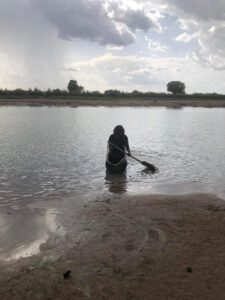In the above image, one of our board of directors is pictured crossing the Nile River to visit the village of Panachir, one of many scattered and hard-to-reach villages in western Gogrial. While this river crossing occurred during the dry season, when crocodiles are generally absent, the Nile river is filled with crocodiles during the winter. The presence of crocodiles, coupled with a pervasive lack of boats, makes it dangerous to undertake river crossings during medical emergencies.
Without access to nearby clinics and medicine, traditional midwives operating in hard-to-reach rural areas are forced to perform emergency services to save the mother or the baby during the birthing process. One traditional practice is to use spears to remove the unborn baby from the mother’s womb, which can kill both the mother and unborn child. Access to midwifery training and midwifery kits for use during delivery are essential for reducing maternal and infant mortality rates.
South Sudan also has a very high adolescent pregnancy rate, estimated at 300 per 1,000 girls, and an adolescent birth rate of 158 per 1,000. Adolescent girls are particularly susceptible to obstructed labor, which can lead to preeclampsia, fistula development, and other maternal morbidities. Fistula development in adolescent pregnancy will affect a female’s quality of life due to a lack of access to surgery to repair a fistula.
CIMISS believes that providing education, training and supplying midwives operating in these hard-to-reach villages with healthcare education and training, and access to basic obstetric tools (midwifery kits) may help reduce fistulas, perinatal morbidities, and preventable deaths. Training traditional midwives and equipping them with basic midwifery kits may help bridge healthcare gaps, and l help reduce preventable perinatal deaths in difficult-to-reach rural areas.

